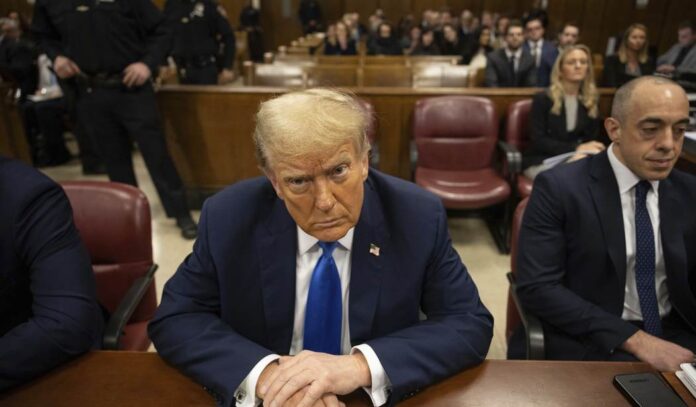For the second time in two days (of court proceedings), former President Donald Trump’s legal team moved for a mistrial in the Manhattan criminal case charging Trump with falsifying business records. On Thursday, Stormy Daniels, the woman whose non-disclosure agreement underlies the prosecution’s claim that the former president wrongly classified payments made to his former attorney, Michael Cohen, as legal expenses, took to the stand for a second day of testimony.
After Tuesday’s testimony, the defense team moved for a mistrial, contending that Judge Juan Merchan allowed in testimony that was prejudicial and not probative. Merchan, while agreeing that there were “some things that would have been better left unsaid,” declined to grant the mistrial, and pointed out to the defense that they had a responsibility to raise timely objections.
READ MORE:
After several more hours of testimony from Daniels on Thursday, Trump’s team again moved for a mistrial and were again shot down by the judge. After stating that he’d reviewed Tuesday’s testimony and his prior rulings and was satisfied that they had not been violated, he asserted that Trump’s attorneys “opened the door” to Daniels providing details regarding the purported encounter when they denied in their opening statement that any sex had taken place between Daniels and Trump.
Merchan, echoing his denial Tuesday of the defense’s initial mistrial motion, said Trump’s lawyers had ample opportunities to object to questions that elicited what they say were damaging details about the alleged sexual encounter.
“There were many times, not once or twice, but many times when Ms. Necheles could’ve objected but didn’t,” the judge said.
In particular, the judge said, the defense should’ve objected to prosecutor Susan Hoffinger’s question about whether Trump used a condom, which led to Daniels’ response that he hadn’t.
“I agree. That should never have come out. That question should never have been asked and that answer should never have been given,” Merchan said. “For the life of me, I don’t know why Ms. Necheles didn’t object.”
Merchan also rebuffed the defense’s claim that Daniels’ testimony so differed from her previous accounts of the alleged events as to warrant a mistrial. “I disagree with your narrative that there’s any new account here,” the judge said.
As many do, I have serious reservations about the scope of the testimony Merchan is permitting in this trial. I’m not sitting right there in the courtroom, but based on what I can glean, he’s been lax in his rulings on several evidentiary matters. That said, he’s absolutely right about one thing: The defense has the responsibility to object to each and every question (or response) that they contend should not be allowed in — and if they don’t, they’re waiving that issue.
Now, from a strategic standpoint, there are times when you forego an objection — even if you might technically be correct — because the particular question/testimony isn’t particularly harmful, and you don’t want to be seen by the jury (or judge) as obstructionist. You have to pick your battles and bear in mind that you’re putting on a show for the jury, and you want them to have the impression that you know what you’re doing and aren’t just throwing stuff out there to see what sticks. (This is where I explain that trying cases is an art.)
But if there’s a critical piece of testimony that should not come into evidence, it is incumbent upon you, the attorney, to make a proper objection on proper legal grounds. And if the judge overrules you, then the judge overrules you. You’ve made your record, and that issue gets added to the list of issues you’ll be raising on appeal — where an appellate court will review what’s there on the record and the legal bases on which you raised your objections and determine if the trial court erred in allowing the evidence to come in. If you don’t raise your objection, you don’t have grounds for appeal. You’re either building your case or deconstructing the opposition’s, with precision, one legal brick at a time. (This is where I explain that trying cases is a science.)
Again, I’m not there in the courtroom — without going through the transcript with a fine-toothed comb, it’s difficult to know for certain how many times Necheles missed an objection she should have made. And there may already be ample evidence in the record that will ultimately support any conviction being overturned. But I’ll tell you one thing: There was very little that I worried about more at trial than making sure I was making a proper record on appeal. For Trump’s sake, he’d best hope his legal team is dotting i’s and crossing t’s on that front.




